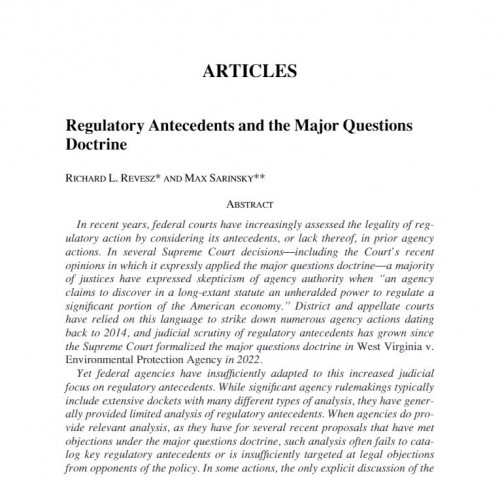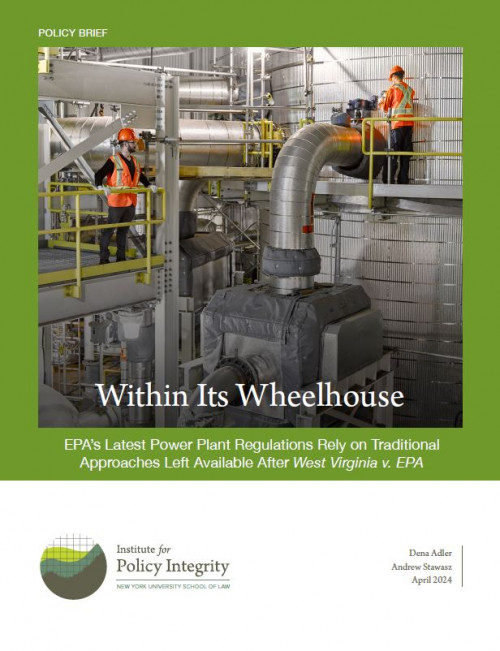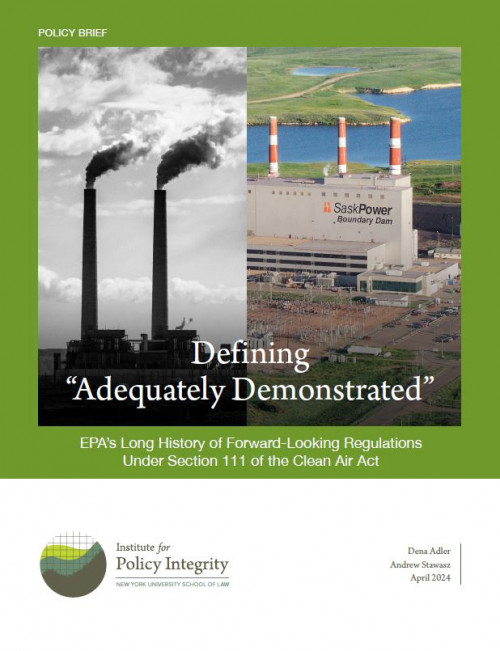-

The Social Cost of Greenhouse Gases: An Overview
A Primer on EPA’s Updated Values for Policymakers and Practitioners
In December 2023, EPA finalized updated values for the social cost of greenhouse gases (SC-GHG), following public comment and expert peer review. The agency derived these estimates using the best available science and economics, and the estimates represent a significant step forward in our ability to properly value climate effects. The brief is intended to introduce policymakers and practitioners to the SC-GHG, break down EPA's updated values, and explain why they represent a powerful tool that can streamline decisionmaking and policy analysis.
-
Policy Integrity Scholarship Cited in Letter from Four New England Senators to ISO-NE
On April 30, 2024, Senators Markey, Sanders, Warren, and Whitehouse sent a letter to ISO-NE President and CEO Gordon van Welie urging the independent system operator to improve its governance policies, proactively plan for new transmission, and ensure fair access to markets for clean energy technologies. The letter advocated for several changes that Policy Integrity has pushed in the past, including increasing opportunities for community participation in energy policy decisions and pursuing longer-term, holistic transmission planning. On the latter point, the letter cited our December 2023 report that advocated for more proactive transmission planning on the part of energy decisionmakers.
-
Comments to DOE on Notice of Intent Regarding Launching a Voluntary Carbon Dioxide Removal Purchasing Challenge
In March 2024, the Department of Energy published a Notice of Intent Regarding Launching a Voluntary Carbon Dioxide Removal Purchasing Challenge. To participate in the Purchasing Challenge, organizations must disclose to DOE several details about each associated carbon dioxide removal (CDR) credit, including the purchaser, supplier, underlying project, and crediting methodology. The Institute for Policy Integrity submitted comments recommending ways DOE could better balance concerns about the disclosure of commercially sensitive information with the benefits of allowing researchers and market actors to access price data.
-
Comments to DOT on Accessibility Rule for Air Travelers with Disabilities Using Wheelchairs
In March 2024, the Department of Transportation (DOT) proposed a multifaceted regulation that would facilitate greater access to air transportation for passengers with disabilities, particularly those who depend on wheelchairs and other assistive devices. Policy Integrity submitted comments to the agency arguing that, while DOT persuasively shows that the Proposed Rule carries many important benefits, the agency should improve upon its proposal and the accompanying benefit-cost analysis in several ways
-
Regulatory Antecedents and the Major Questions Doctrine
Published in the Georgetown Environmental Law Review
In recent years, federal courts have increasingly assessed the legality of regulatory action by considering its antecedents, or lack thereof, in prior agency actions. Yet as this article explains, federal agencies have insufficiently adapted to this increased judicial focus on regulatory antecedents. While significant agency rulemakings typically include extensive dockets with many different types of analysis, they have generally provided limited analysis of regulatory antecedents. This article suggests that agencies more extensively catalog regulatory antecedents at all stages of the rulemaking process, from drafting to promulgation.
-
Policy Integrity Scholarship and Advocacy Reflected in CEQ’s Rule for Conducting Environmental Review
On April 30, CEQ revised its implementing regulations for the National Environmental Policy Act that undergird how federal agencies conduct environmental review of proposed projects. Consistent with federal caselaw, CEQ’s regulations emphasize the need to consider climate change and environmental justice impacts in environmental review, among other key revisions. These revisions are also consistent with suggestions that Policy Integrity has offered through our scholarship, reports, and comments on ensuring careful consideration of climate change and environmental justice in federal permitting. In addition, CEQ implemented several of Policy Integrity’s suggestions to enhance its cost-benefit analysis for this rulemaking.
-
Policy Integrity Recommendations Reflected in DOE’s Transmission Permitting Rule
On April 25, 2024, the Department of Energy (DOE) released its final rule under 16 U.S.C. § 824p(h) to expedite the federal authorization of transmission projects. We commented in support of the proposal, including DOE's proposed requirement that project proponents describe how the transmission project would affect power-system greenhouse gas (GHG) emissions. In the final rule, DOE retained the requirement to describe power-system GHG impacts and, in response to our recommendation, clarified that the ambiguous language in the proposal does require project proponents to estimate non-power-system GHG emissions and power-system emissions of local air pollutants.
-
Policy Integrity Suggestions Reflected in DOT’s Final Rule Requiring Automatic Refunds of Airline Tickets
On April 24, 2024, DOT issued a final rule on airline ticket refunds which, among other things, will require airlines to offer refunds when a passenger’s itinerary is significantly changed or delayed, and will require that passengers be given a ticket voucher if a serious communicative disease prevents them from flying. We submitted comments to DOT in November 2022 explaining that, in our view, DOT’s benefit-cost analysis was underestimating the benefits of these policies. DOT’s finalized analysis discusses our comments extensively, and implements many of our suggestions.
-
Within Its Wheelhouse
EPA’s Latest Power Plant Regulations Rely on Traditional Approaches Left Available After West Virginia v. EPA
In May 2023, EPA proposed new limits for greenhouse gas (GHG) emissions from certain fossil-fuel-fired power plants under Section 111 of the Clean Air Act. Some critics have suggested that EPA’s new rule triggers the major questions doctrine. Under that doctrine, a court should look skeptically on the agency action in extraordinary cases involving unprecedented and transformative applications of agency authority. But the major questions doctrine is inapplicable to EPA’s use of CCS in its proposed regulations. Rather than propose a new approach that would transform its exercise of statutory authority, EPA has embraced one of its most traditional and well-established regulatory practices: setting emission limits based on pollution controls that cause a regulated source to operate more cleanly. This policy brief details why EPA’s latest proposal to limit GHG emissions from power plants fits neatly within the bounds of the legal authority left intact after West Virginia. It then explains how states and operators retain flexibility to use emission trading and averaging programs to implement EPA’s regulations.
-
Defining “Adequately Demonstrated”
EPA’s Long History of Forward-Looking Standards Under Section 111 of the Clean Air Act
In May 2023, the Environmental Protection Agency (EPA) proposed new limits for greenhouse gas (GHG) emissions from certain fossil-fuel-fired power plants under Section 111 of the Clean Air Act. Section 111 requires EPA to set limits reflecting the emission reductions achievable by applying what the agency determines to be the “best system of emission reduction” (BSER) that “has been adequately demonstrated,” and that meets certain other statutory factors. This policy brief summarizes the legal framework of Section 111 (including the legislative history and caselaw relevant to understanding its technology-forcing nature), walks through how courts have interpreted “adequately demonstrated,” reviews EPA’s past use of Section 111 to drive technology improvements, and explains why a potential Supreme Court decision that eliminates or curtails Chevron deference (a legal doctrine providing deference to reasonable agency interpretations of ambiguous statutory language) would not affect the longstanding interpretation of “adequately demonstrated.”








